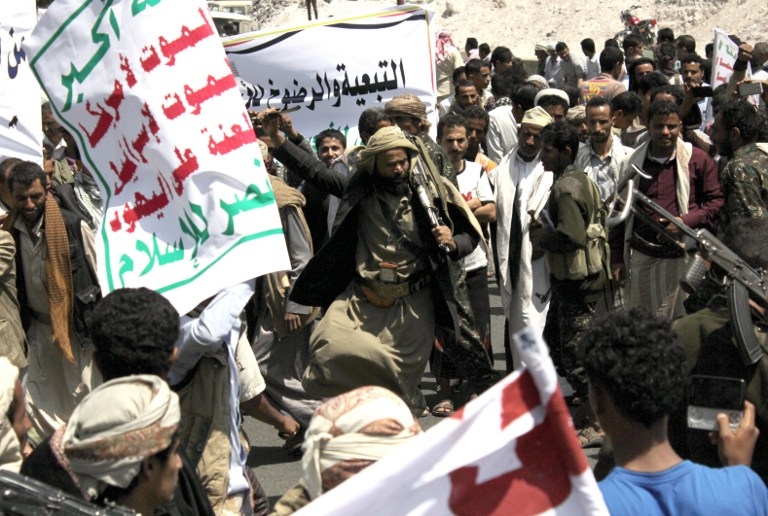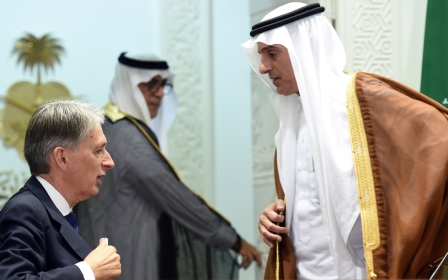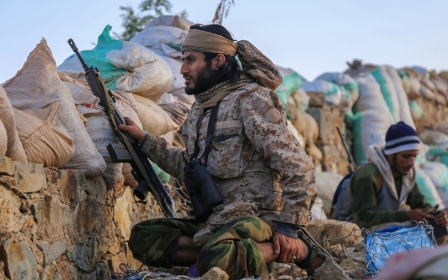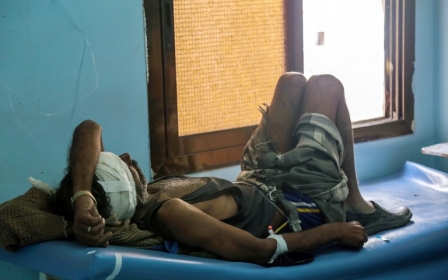Taiz court closures force Yemenis to take matters into their own hands

AL-GHAIL, Yemen - When Omar al-Bakri saw a group of armed men from the Zakaira family approach him, he opened fire. The armed men retaliated, leading to a firefight that lasted over half an hour. When the dust settled, one man from the Zakaira family had been killed.
The clash took place because the Zakaira family had tried to seize an area of disputed land from the Bakri family in al-Ghail village, near Taiz’s al-Mawaset district.
"I am an aggrieved man, and I am not a killer as people say. I only tried to protect my land from the Zakaira family, who tried to take my land by force. Then, by mistake, I killed one of the attackers, who was trying to kill me during the clashes," Bakri told Middle East Eye.
Bakri killed Abdullah al-Zakaira on 25 October, and then escaped the village with nine family members to an undisclosed location.
"I killed an armed man in self-defence, and I am willing to surrender to the police. But I am not willing to surrender to my enemies, because they will kill me," Bakri said.
After the Bakri family escaped their village, the Zakaira family seized all of their lands in the village, in addition to their house, and prevented relatives of the Bakri family from entering the house, telling them to bring the killer.
The land dispute between the two families highlights the province’s legal vacuum. When war broke out in Taiz in March 2015, the province’s judicial system shut down, forcing the local population to solve legal disputes on their own accord.
"The main reason of our problem is the government, as there is not a court that can solve our matter. If there were courts, our matter would be solved easily, and when there is security in Taiz, immediately I will surrender myself," Bakri said.
Seeking revenge
Members of the Zakaira family have Bakri's telephone number and have contacted him to surrender. Bakri has refused to do so, waiting for the government to recapture the police stations from the resistance fighters and the Houthis.
One of the cousins of the late Abdullah al-Zakaira, Murad, told MEE that he is unable to forgive Bakri, and promises to chase him until he exacts revenge for his cousin.
"I contacted the murderer and asked him to surrender to the Popular Resistance, but he refused to do, and preferred to be far from justice, but I will not let him escape," Zakaira added.
He said that he had information about the area where Bakri is hiding, and he plans to weed him out.
"I found out that he has begun to gather supporters to protect him in his hideout, but also I have men that can fight very well," he said.
Murad hopes that Bakri surrenders to the resistance. From his perspective, the resistance gave the Zakairi family permission to take the strip of land in question. He considers the Popular Resistance to be the legitimate alternative to the government in Taiz.
"We are not thugs - there was a dispute between our family and Bakri's family, and when our sheikh, Salam Ahmed, could not solve our disputes, we went to the resistance in our district and complained, but Bakri refused to go to the resistance and said that he would wait for the courts to reopen. Then the resistance gave us permission to take over the land," he said.
The sheikh of the village, Salam Ahmed, told MEE that he has received information about more than three matters per day since the courts have closed, but stressed that he does not have the time to solve each dispute.
"Most of the problems that I receive are disputes over lands, and I cannot solve most of them, as these are difficult problems and need force in order to be solved, but I try to solve the easy ones," he told MEE.
Ahmed said that land disputes have increased in rural areas when people living in the cities fled to look for their parents’ land.
He pointed out that the price of the disputed land between the Zakaira and Bakri families is around 400,000 Yemeni rials ($1,860), but neither party has agreed to give up.
Courts cannot be neutral
When one of the warring parties in Yemen - either the Houthis or the Popular Resistance - takes over any area, they assume control over the public institutions in that area, including the courts, and for this reason the courts cannot work freely, according to the judge in al-Shimayateen district court, Taher al-Mathhagi.
"If the courts in Taiz reopen, the warring sides will not let the judges work freely and they will impose themselves on the courts, as they are doing with the police stations nowadays; they are replacing the police stations. Therefore, I prefer that the courts do not reopen until there is a government that can control the country," Mathhagi told MEE.
He admitted that closing the courts was a primary reason why residents have taken matters into their own hands, but he believes that this is better than making the courts biased against one party.
Ahmed said: "If the courts are not neutral, the crimes will spread wider - the aggrieved people cannot accept unjust judgments."
A social expert and professor in Taiz University, Fadhl al-Thobhani, told MEE that the extrajudicial actions in rural areas are a consequence of the civil war, and that even if the courts opened during wartime, the crimes would not lessen.
"The courts cannot be neutral if the militias spread everywhere in the country. First of all, the militias have to disappear from the country, then we can talk about resuming the work of the courts,” Thobhani said.
Middle East Eye propose une couverture et une analyse indépendantes et incomparables du Moyen-Orient, de l’Afrique du Nord et d’autres régions du monde. Pour en savoir plus sur la reprise de ce contenu et les frais qui s’appliquent, veuillez remplir ce formulaire [en anglais]. Pour en savoir plus sur MEE, cliquez ici [en anglais].




